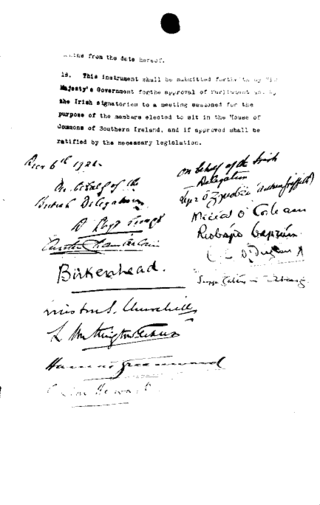
The 1921 Anglo-Irish Treaty, commonly known in Ireland as The Treaty and officially the Articles of Agreement for a Treaty Between Great Britain and Ireland, was an agreement between the government of the United Kingdom of Great Britain and Ireland and representatives of the Irish Republic that concluded the Irish War of Independence. It provided for the establishment of the Irish Free State within a year as a self-governing dominion within the "community of nations known as the British Empire", a status "the same as that of the Dominion of Canada". It also provided Northern Ireland, which had been created by the Government of Ireland Act 1920, an option to opt out of the Irish Free State, which the Parliament of Northern Ireland exercised.

Otto August Strandman was an Estonian politician, who served as prime minister (1919) and State Elder of Estonia (1929–1931). He was one of the leaders of the centre-left Estonian Labour Party, that saw its biggest support after the 1919 and 1920 elections. Strandman was a key figure in composing the radical land reform law and the 1920 Constitution. He also served as Minister of Agriculture (1918–1919), Minister of Justice, Minister of Finance (1924), Minister of Foreign Affairs and Minister of War (1919). While he was holding the office of the Minister of Finance, he stabilized the economy and managed to avoid hyperinflation. Strandman served as the speaker of the Estonian Provincial Assembly in 1917–1918, and as speaker of the newly independent country's parliament (Riigikogu) in 1921. He was also a diplomat, serving as the Estonian envoy in Warsaw, Poland (1927–1929), and in Paris, France (1933–1939).

Otto Bahr Halvorsen was a Norwegian lawyer and politician from the Conservative Party, who served as the 14th prime minister of Norway from 1920 to 1921 and again in 1923 up until his death in office.
Asbjørn Halvorsen, nicknamed Assi, was a Norwegian footballer, who played as a centre-half for Sarpsborg FK and Hamburger SV. He was capped 19 times playing for Norway, and was a part of the Norwegian team who competed in the 1920 Summer Olympics. He was later Secretary general of the Norwegian Football Association, and acted as head coach of the Norwegian national team. He is regarded as the architect behind the Norwegian "Bronze Team" that finished third in the 1936 Olympics.
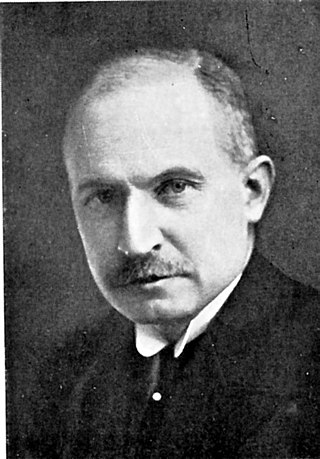
Gerdt Henrik Meyer Bruun was a Norwegian industrialist and a politician for the Conservative Party. The son of factory owner Engelbrekt Christen Bruun (1839-1913), he took over his father's business in 1897. He entered politics shortly after this, and served as deputy mayor and later mayor of Årstad from 1901 to 1915. In 1919, Bruun was elected to the Norwegian parliament for a three-year period. He was then appointed Minister of Trade in the cabinet of Otto Bahr Halvorsen, lasting from 1920 to 1921.
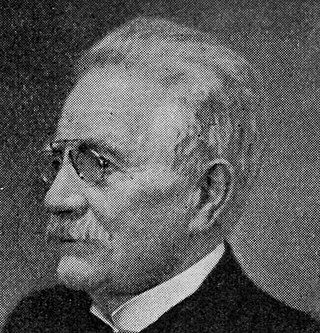
Edvard Hagerup Bull was a Norwegian jurist and assessor of the Supreme Court of Norway. He was a member of the Norwegian Parliament and government official with the Conservative Party of Norway.
Johan Henrik Rye Holmboe was a Norwegian businessperson and politician for the Free-minded Liberal Party. He was a city council member in Tromsø for 42 years, a three-term member of Parliament, Minister of Provisioning from 1920 to 1921, and Minister of Trade from 1923 to 1924.

Nils Riddervold Jensen was a Norwegian educator and politician for the Conservative Party.
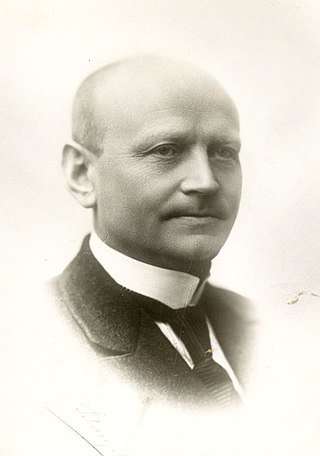
Anders Venger was a Norwegian politician of the Conservative Party. He served Minister of Agriculture from 1923 to 1924, Minister of Labour from March to July 1926 and acting Minister of Education and Church Affairs from November to December 1923 following the death of Ivar Bergersen Sælen. He also served as deputy leader of the Conservative Party from 1920 to 1925.

Stoltenberg's Second Cabinet was the Government of Norway from 17 October 2005 to 16 October 2013. It was a coalition between the Labour Party, the Socialist Left Party and the Centre Party, known as the Red–Green Coalition. On 9 September 2013, the coalition was defeated in the 2013 election.
Events in the year 1872 in Norway.
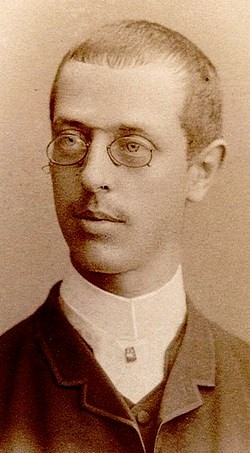
Christian Fredrik Michelet was a Norwegian lawyer and politician for the Conservative Party.

Bahr Halvorsen's Second Cabinet governed Norway between 6 March 1923 and 30 May 1923. It ceased to exist after the death of Prime Minister Otto Bahr Halvorsen. It had the following composition:
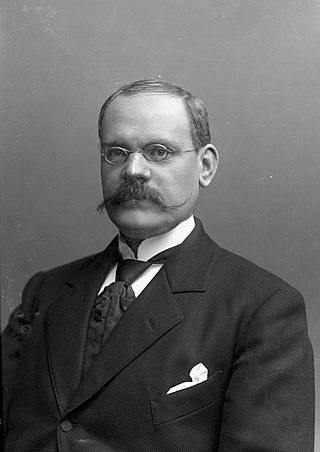
The Hagerup's Second Cabinet governed Norway between 22 October 1903 and 11 March 1905. It fell as the cabinet ministers collectively resigned on 28 February and 1 March 1905, as part of the build-up for the dissolution of the union between Norway and Sweden in 1905. Christian Michelsen withdrew his application, and could form the cabinet Michelsen. It had the following composition:

The Stang's First Cabinet governed Norway between 13 July 1889 and 6 March 1891. It was led by Emil Stang and is one of two Conservative Party-only cabinets ever in Norway, the other being Willoch's First Cabinet from 1981 to 1983. It had the following composition:
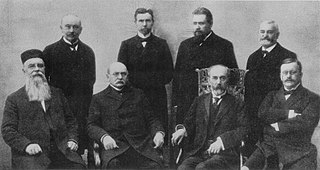
Knudsen's First Cabinet governed Norway between 19 March 1908 and 2 February 1910. It had the following composition:

The Michelsen's Cabinet was a Norwegian cabinet, formed by a coalition of the Liberal Party, the Conservative Party, the Moderate Liberal Party and the Coalition Party. It governed Norway between 11 March 1905 and 23 October 1907. It entered office as part of the build-up for the dissolution of the union between Norway and Sweden in 1905. It had the following composition:

Konow's Cabinet was a Norwegian cabinet, formed by a coalition of the Conservative Party and the Free-minded Liberal Party. It was in office from 2 February 1910 to 20 February 1912.
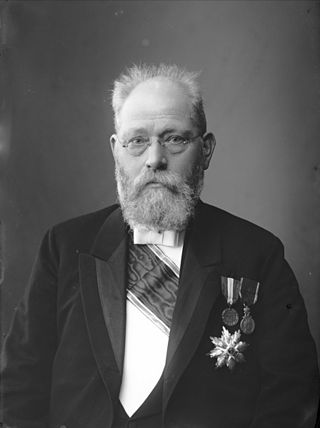
Berge's Cabinet was the government of Norway from 30 May 1923 to 25 July 1924. The cabinet was led by Prime Minister Abraham Berge. It succeeded Otto Bahr Halvorsen's second cabinet following his death, and was composed of mostly the same ministers as its predecessor. The cabinet resigned on 23 July 1924, with effect two days later, after not getting wide support in the Storting for a alcohol ban. It was succeeded by Johan L. Mowinckel's first cabinet.

Knudsen's Second Cabinet was the government of Norway from 31 January 1913 to 21 June 1920, led by prime minister Gunnar Knudsen. It was a Liberal Party minority government. It was formed following Jens Bratlie's defeat in the 1912 election.
















